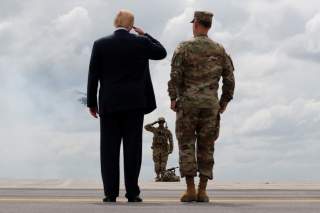Does Peter Bergen Truly Understand Trump?
In Trump and His Generals: The Cost of Chaos, Peter Bergen can’t make up his mind about the forty-fifth president and his conduct of foreign policy
“Trump got one really big foreign policy issue at least in part right, which was China,” Bergen continues, praising the president for taking a long-overdue stand against Beijing’s predatory trade and commercial practices. As well, Bergen admires how Trump “skillfully switched the security conversation with the Chinese” from their annexation of the South China Sea to the shared danger of Kim Jong-un’s nuclear weapons, a sleight of diplomatic hand that “helped to get the Chinese to play a role in the enforcement of United Nations sanctions against North Korea.” And the administration’s success in securing the release of hostages from Pyongyang and elsewhere “was certainly something the president could celebrate.”
In Syria, Bergen reports, the commander-in-chief “did push down to his military commanders the authorities for taking action against ISIS” and “did away with the self-imposed limits that the Obama team had put on military action” in the theater. “So Trump could certainly take credit for hastening the demise of ISIS’ geographical ‘caliphate,’” Bergen writes. The national security team also “deftly defused an ISIS plot” to insert bombs into laptop computers aboard U.S.-bound planes, and the president, “visibly moved” by the images of Syrian children suffering from chemical weapons attacks, delivered “one of his best speeches” when he announced airstrikes he had ordered in response.
At one point, Bergen edges dangerously close to endorsing the president’s view of himself as a besieged figure, unjustly preyed upon by intellectually dishonest elements in academia, the news media, and think tanks.
His critics had predicted that if he moved the embassy to Jerusalem, it would inflame the whole Middle East. They said that pulling out of the Iran deal would deeply anger European allies and set Iran down the path to nuclear enrichment again. They said that slapping tariffs on steel and aluminum would damage the American economy, and pulling out of the Paris climate agreement would accelerate global warming … [T]hese bad things didn’t immediately come to pass…
To the contrary, Bergen acknowledges,
Trump did avoid making major unforced foreign policy errors … [and] did have some foreign policy wins … Trump oversaw an effective campaign against ISIS; he made a long-term military commitment to Afghanistan … he drew a clear “red line”… in Syria … and … his first overseas trip as president, to Saudi Arabia … was generally seen as a success because of his effective outreach to Arab states … Two and a half years into his term, Trump had largely achieved his goals: the Pentagon was considerably better resourced while ISIS was defeated. At the same time, Trump was drawing down from the wars in Afghanistan, Iraq, and Syria.
IN SHORT, Bergen’s praise for the forty-fifth president is so pervasive, so recurrent, that it may leave some readers wondering if the author isn’t quite happy to pay “the cost of chaos” exacted by Trump’s mercurial, unrestrained, and largely successful approach to the conduct of foreign policy and national security. Trump and His Generals went to press as the impeachment inquiry, focused on Ukraine, was just gaining traction; but the certain resolution of the matter by the Republican-controlled Senate in Trump’s favor renders the episode something of an anomaly for Bergen, extraneous to his attacks on Trump and his treatment of “his” generals. Instead the author, perhaps unwittingly, pays the incumbent the supreme compliment when he notes: “The most reliable guide to what Trump did when he was in office was what he had said when he was campaigning."
James Rosen is an investigative reporter for the Sinclair Broadcast Group and the author, among other books, of Cheney One on One.
Image: Reuters

